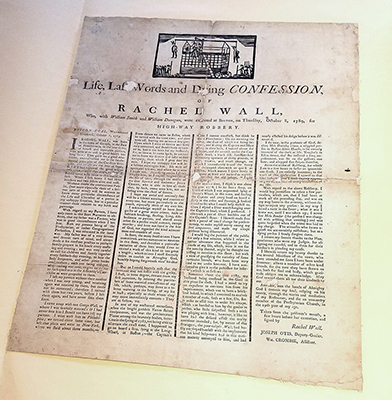By Rakashi Chand, Reader Services
For Talk Like a Pirate Day we bring you the words of a Pirate!
The MHS holds an interesting broadside featuring Massachusetts’ only female Pirate: Life, last words and dying confession, of Rachel Wall : who, with William Smith and William Dunogan, were executed at Boston, on Thursday, October 8, 1789, for high-way robbery.

Arrested and convicted of highway robbery, Rachel Wall was the last woman executed by the Commonwealth of Massachusetts, hung on Boston Common for stealing a bonnet.
The broadside features a fascinating woodcut illustration of three criminals being hung on Boston Common. The middle figure is depicted as a woman wearing a dress. But this confession serves a much greater purpose as it is the autobiography of a very unique woman. Although Rachel’s crimes were dreadful, her life is an undeniable part of Massachusetts history. A criminal master mind? Perhaps. Ruthless and Vicious? Certainly. The perfect Halloween Costume? Definitely!
Who was Rachel Wall?
Rachel Wall was born in Pennsylvania, to a good family, by her own description. After running away from home, she met and married George Wall, with whom she moved to Boston. George left Rachel and went off to sea, only to return one day to reunite with Rachel and coax her into being a pirate. In her confession Rachel says, “for, as soon as he came back, he enticed me to leave my service, and take to bad company, from which I might date my ruin.” Supposedly, they attacked ships off the Isles of the Shoals, on the coast of New Hampshire although we do not have actual evidence and this is not mentioned in the Confession. It is believed that after storms, Rachel would stand on the deck of their ship pretending to be distressed and would scream for help; when sailors came to her rescue, George and his men would kill them and plunder their ships. In her confession, Rachel states that she does not know the whereabouts of her husband, “He went off again and left me, and where he is now I know not.” It is believed that George and his crew were washed out to sea. George Wall might have been a privateer during the Revolution, acquiring a taste for plundering ships.
Rachel returned to Boston and worked as a maid but could never fully become a law-abiding citizen. She continued to ‘plunder’ by sneaking aboard docked ships and grabbing what she could. She describes one excursion on Long Wharf in Boston, “On my entering the cabin, the door of which not being fastened, and finding the Captain and Mate asleep in their beds, I hunted about for plunder, and discovered under the Captain’s head, a black silk handkerchief containing upwards of thirty pounds, in gold, crowns, and small change, on which I immediately seized the booty and decamped therewith as quick as possible, which money I spent freely in company as lewd and wicked as myself.” (Does anyone else hear Pirate-speak?)
Rachel was eventually convicted of highway robbery. Supposedly, she saw a lovely bonnet that she simply couldn’t resist and attacked 17-year-old Margret Bender, the woman wearing the bonnet. Having already been convicted of two counts of robbery, this, the third count, was punishable by death. She could not deny her proven past, so in her confession she lists many petty crimes, carefully avoiding the mention of any that might be a felony. She was wise enough to know that she could not convince people that she was innocent, so instead choose to portray herself as under the influence of her dreadful husband. Attorney General Robert Treat Paine requested “that sentence of death might be given against the said Rachel Wall, the prisoner at the bar” and Governor John Hancock signed the order of execution. One could perhaps speculate that she was being sentenced for crimes far greater than the attempted robbery of a bonnet, tried as a thief, but executed for piracy?
Unfortunate for her, Rachel’s crime came at the height of turmoil for the new Nation, and the courts–which traditionally gave women lesser punishments than men–tried her as an equal sentencing her to hang with two other men also accused of highway robbery. Six years later un-armed burglary was no longer punished by death; the three were the last to be executed in Massachusetts for robbery. If there were ever a spirit to haunt the streets of Boston, It would certainly be Rachel Wall, executed on Boston Common for stealing a bonnet at 29 years of age.
*****
Sources:
Massachusetts Historical Society. Proceedings of the Massachusetts Historical Society, (Boston: The Society 1905) Volume 39, March 1905 p.178-190
Rachel Wall, Pirate by the National Park Service (Accessed September 19, 2018)
http://www.cindyvallar.com/RachelWall.html (Accessed September 19, 2018)

